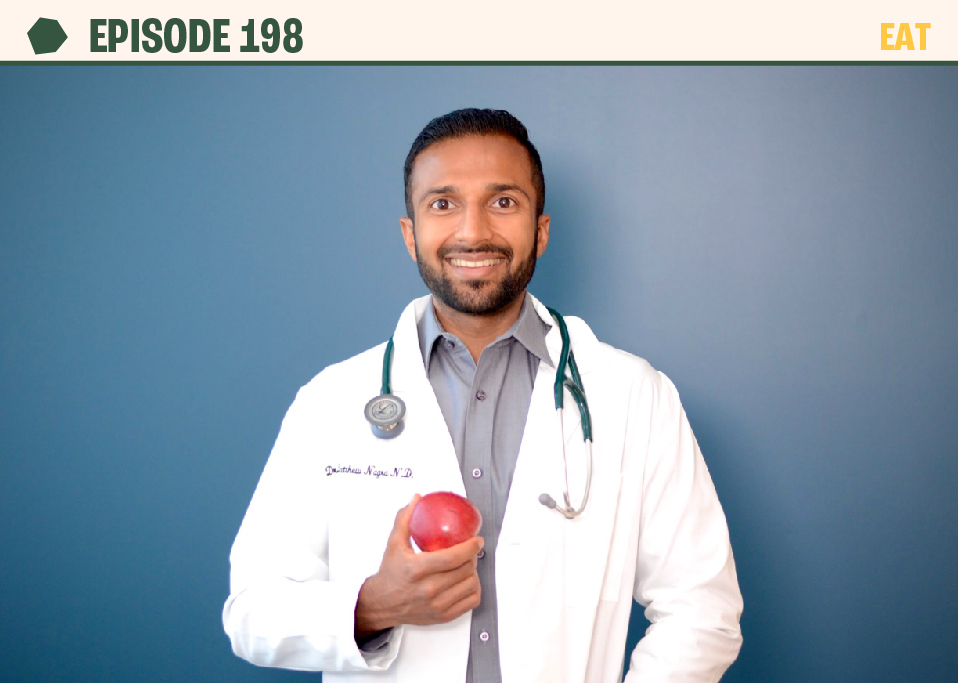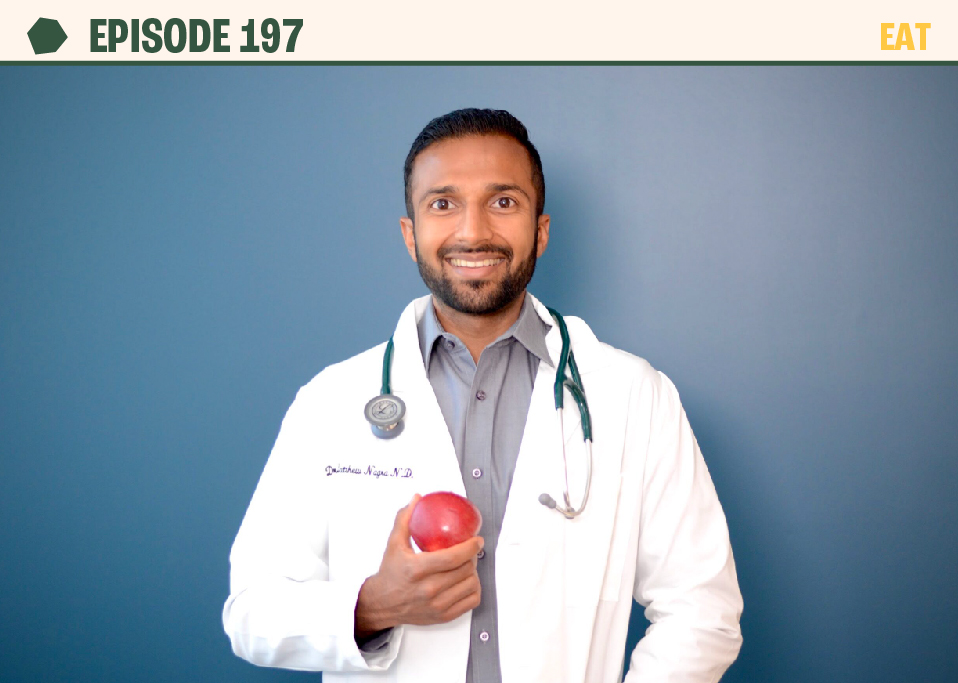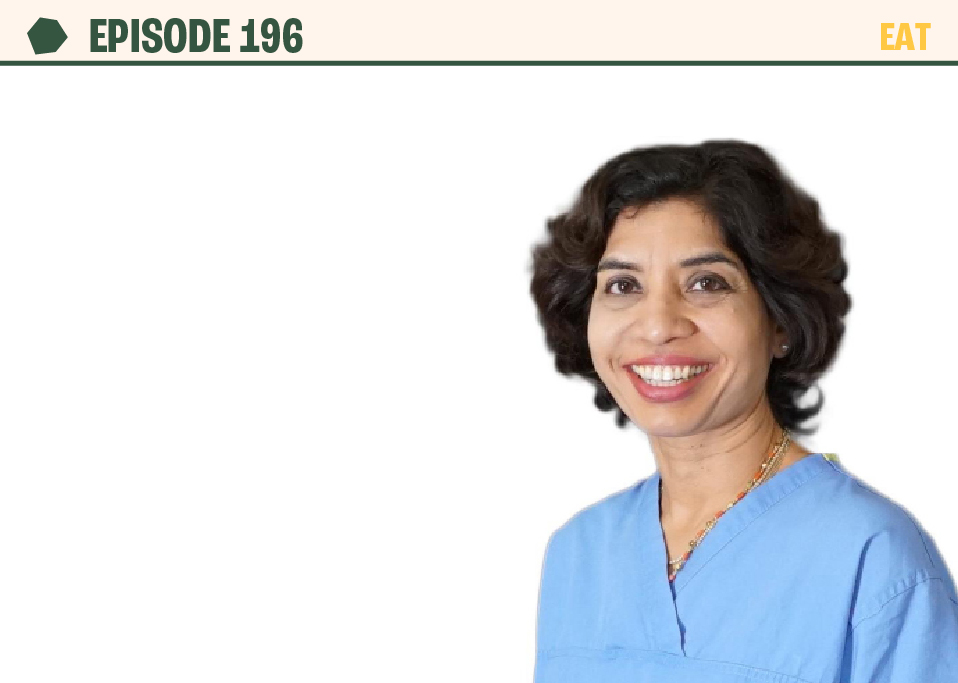As Plant Proof continues on the journey of digging into evidence-based nutrition with nuance, we return to controversial discourse on soy consumption.
“We have a lot of data on soy and health outcomes, and it’s almost exclusively in the direction of benefit.”
Last week, Dr Matthew Nagra helped dispel some of the myths around soy and hormones, offering his insight into the science-backed benefits of soy. In case you missed it, Dr Nagra is a Naturopathic Doctor with an evidence-based focus. He brings the most up-to-date research to his patients and uses his thorough and nuanced understanding to educate wider audiences through his social media platforms.
“Just because something is processed, doesn’t mean it’s unhealthy.”
In Episode #198, Dr Nagra returns for part two of our deep dive into soy and its impact on human health. In this episode we investigate more of the evidence, exploring soy’s relationship to cardiovascular disease, insulin resistance, Type 2 diabetes, bone health, muscle, and strength.
Specifically, we cover:
- Questions from last week, including soy’s relationship to PCOS and endometriosis, whether buying organic or non-GMO soy products matters, and soy’s impact on the environment [4:05]
- How soy foods effect biomarkers of disease [11:15]
- The Portfolio diet [13:45]
- Nut and oil consumption, low fat diets, and cardiovascular risk [16:30]
- Cardiovascular factors and why soy may have favourable health outcomes [23:00]
- Soy, insulin resistance, and Type 2 diabetes [30:00]
- Polyunsaturated fats, low carb diets, and blood glucose control [36:20]
- Whether food processing matters [39:20]
- Soy and bone health [42:20]
- Muscle, strength, and whether soy protein is inferior [46:20]
- Choosing a plant-based milk [53:10]
- Iron and a plant-based diet [56:20]
- And much more.
I’m glad we had the opportunity to expand on our discussion of soy over two episodes. In Dr Nagra’s words, “Soy is an incredible food… it’s a huge benefit to pretty much anybody who has access to it.” I hope that by approaching this discussion with an evidence-based focus you gained some knowledge on this incredibly beneficial food, and potentially dispelled any unfounded concerns you may have had. The overwhelming, unjustified noise online about the “risks” of soy can be difficult to navigate, and I encourage you to return to these episodes if you need to.
If you found Dr Nagra’s insights informative, make sure to keep an eye out for his upcoming debate on seed oils. I will be hosting this debate on my new platform, The Proof, coming very soon. You can sign up to be notified when The Proof launches here.
To learn more or connect with Dr Matthew Nagra, you can reach him on Instagram, Twitter, Facebook, and his website. You can also listen to his previous episodes, Episode #113, Episode #133, and Episode #197.
The best way to support the show is to use the products and services offered by our sponsors. To check them out, and enjoy great savings, visit theproof.com/friends.
Enjoy, friends.
Simon
Additional resources
- The Effects of Soy Isoflavones on Metabolic Status of Patients With Polycystic Ovary Syndrome PMID: 27490918
- The effect of dietary soy intake on weight loss, glycaemic control, lipid profiles and biomarkers of inflammation and oxidative stress in women with polycystic ovary syndrome: a randomised clinical trial PMID: 29468748
- The effects of soy isoflavones on total testosterone and follicle-stimulating hormone levels in women with polycystic ovary syndrome: a systematic review and meta-analysis PMID: 32436742
- A Meta-Analysis of 46 Studies Identified by the FDA Demonstrates that Soy Protein Decreases Circulating LDL and Total Cholesterol Concentrations in Adults PMID: 31006811
- Soy and Health Update: Evaluation of the Clinical and Epidemiologic Literature PMID: 27886135
- Effects of high- and low-isoflavone soyfoods on blood lipids, oxidized LDL, homocysteine, and blood pressure in hyperlipidemic men and women PMID: 12145008
- Soy intake is associated with lowering blood pressure in adults: A systematic review and meta-analysis of randomized double-blind placebo-controlled trials PMID: 33636295
- Effects of red meat, white meat, and nonmeat protein sources on atherogenic lipoprotein measures in the context of low compared with high saturated fat intake: a randomized controlled trial PMID: 31161217
- Association between consumption of soy and risk of cardiovascular disease: A meta-analysis of observational studies PMID: 28067550
- Effects of red meat, white meat, and nonmeat protein sources on atherogenic lipoprotein measures in the context of low compared with high saturated fat intake: a randomized controlled trial PMID: 31161217
- Association between consumption of soy and risk of cardiovascular disease: A meta-analysis of observational studies PMID: 28067550
- Legume and soy intake and risk of type 2 diabetes: a systematic review and meta-analysis of prospective cohort studies PMID: 31915830
- Partly replacing meat protein with soy protein alters insulin resistance and blood lipids in postmenopausal women with abdominal obesity PMID: 25008579
- Effects of Saturated Fat, Polyunsaturated Fat, Monounsaturated Fat, and Carbohydrate on Glucose-Insulin Homeostasis: A Systematic Review and Meta-analysis of Randomised Controlled Feeding Trials PMID: 27434027
- Soy Foods and the Risk of Fracture: A Systematic Review of Prospective Cohort Studies PMID: 34547749
- Soy isoflavones prevent bone resorption and loss, a systematic review and meta-analysis of randomized controlled trials PMID: 31290343
- No Difference Between the Effects of Supplementing With Soy Protein Versus Animal Protein on Gains in Muscle Mass and Strength in Response to Resistance Exercise PMID: 29722584
- The Associations of Soy Intakes with Non-communicable Diseases: A Scoping Review of Meta-Analyses PMID: 35249559
More about Dr Nagra
Dr. Matthew Nagra is a Naturopathic Doctor devoted to bringing the most up-to-date evidence-based nutrition information to his patients at his clinic in Vancouver. In 2018 he graduated from the Boucher Institute of Naturopathic Medicine after completing his Bachelor of Science in Microbiology at the University of Victoria. He’s certified in plant-based nutrition through eCornell and the T Colin Campbell’s Center for Nutrition Studies. Dr. Nagra is also a public speaker and is known for his content across multiple social media platforms, where he often tackles misinformation around diet and nutrition, and deep dives into the latest nutrition research.







